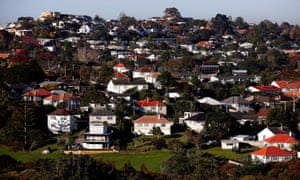Jacinda Ardern’s flagship KiwiBuild policy labelled ‘a failure’ amid delays and claims homes are too expensive

Jacinda Ardern’s flagship housing policy is in dire straits after the government admitted it won’t meet its target of building 1,000 affordable homes in its first year – and is set to fall short by 700.
New Zealand house prices are among the most unaffordable in the world, with Auckland the seventh most expensive city to buy a home, and all three major cities considered “severely unaffordable” by the latest Demographia international housing affordability survey.
In 2018 the Labour coalition government banned the sale of existing New Zealand homes to overseas buyers and launched its flagship KiwiBuild scheme; aiming to build 100,000 affordable homes in 10 years, with 1,000 of them scheduled for the first year.
But since July just 47 KiwiBuild homes have been completed – and housing minister Phil Twyford has said the government is unlikely to reach its target of 1,000 by June 2019 – putting the success of the project in jeopardy.
Last week the chief executive of KiwiBuild resigned following an employment dispute, in another blow for the scheme.
“In the first six months of the KiwiBuild programme it’s been tougher than expected to get the early numbers up … I think it’s going to be tough to meet that target,” Twyford told Radio NZ.
Twyford said it had been difficult to attract private developers to build smaller, more affordable homes, when they had previously focused on large and expensive construction projects.
Economist Shamubeel Eaqub agreed, saying the government should switch its attention to building rental properties instead.
Euqab said despite the urgency of the problem the government appeared to lack “ambition” in dealing with the severe lack of affordable housing.
“There is never a market for poor people, it is not profitable to build houses for poor people. That’s the challenge,” said Euqab.
Alain Bertaud, a former World Bank principal urban planner, said that despite New Zealand being an otherwise “exceptionally well-managed country” its housing market was in a state of crisis. He said the government’s efforts were being closely watched because they were broadly following global best practice in improving housing affordability.
The government’s measures would “take time” to implement and take effect, Bertaud said. “After the government has successfully passed these reforms, the international community will watch with great interest the impact it will have on Auckland … in the next few years,” Bertaud said in the report.
Many of the KiwiBuild homes already completed are languishing on the market, with many considering NZ$525,000 (£273,000) for a two-bedroom home far from affordable.
In Auckland and Queenstown – the two most expensive cities in New Zealand – KiwiBuild houses are capped at NZ$500,00 for a one-bedroom home, NZ$600,000 for a two-bed, and NZ$650,000 for three bedrooms or more.
The authors of the Demographia International Housing Affordability survey class a house as affordable if the median price is up to three times the median wage – making the government’s KiwiBuild houses “severely unaffordable” for most.
On Trade Me, New Zealand’s largest online auction website, some private home sales were being advertised as “cheaper than a KiwiBuild” and “much more affordable than KiwiBuild”.
The oppositions spokesperson for housing, Judith Collins, said it appeared that Kiwis didn’t want a KiwiBuild home, and the project was a failure.
“It’s incredibly embarrassing for the minister, who not only can’t reach his much-plugged target of 1,000 KiwiBuild homes, but the houses he has built are clearly not what first home buyers want,” said Collins.
“The minister’s blatant disregard for detail has been shown time and time again, and now he’s putting hardworking taxpayer money at risk because of it.”
As 2019 begins…
… we’re asking readers to make a new year contribution in support of The Guardian’s independent journalism. More people are reading and supporting our independent, investigative reporting than ever before. And unlike many news organisations, we have chosen an approach that allows us to keep our journalism open and accessible to all, regardless of where they live or what they can afford. But this is only possible thanks to voluntary support from our readers – something we have to maintain and build on for every year to come.
The Guardian is editorially independent, meaning we set our own agenda. Our journalism is free from commercial bias and not influenced by billionaire owners, politicians or shareholders. No one edits our editor. No one steers our opinion. This is important as it enables us to give a voice to those less heard, challenge the powerful and hold them to account. It’s what makes us different to so many others in the media, at a time when factual, honest reporting is critical.
Please make a new year contribution today to help us deliver the independent journalism the world needs for 2019 and beyond.
